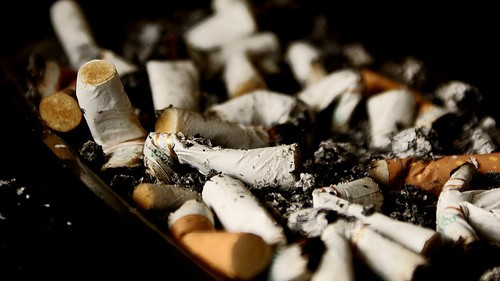Is Time Right for Ban on Smoking in Your Own Home?

David Cameron has promised to outlaw smoking in cars carrying children as soon as possible, declaring it is a policy whose "time is right".
After an initial hesitation, the prime minister sent out the message that he supported such a ban and it was overwhelmingly backed by 376 to 106 in a free Commons vote.
The practice will now be made illegal before the general election next year. A separate bid to force all cigarettes to carry plain packaging is currently subject of a review and could also eventually become law, stopping colourful, appealing advertising of tobacco products.
But there is also a wider question of whether these are all just the latest steps down a path to an eventual outright ban on smoking in private as well as public, precisely the fear many opponents of the ban have expressed.
Politicians have always resisted such calls, believing it would be a step too far into interfering into personal freedoms, and Cameron has no intention of going down that route.
When asked whether the prime minister believed it would be "irresponsible" for people to smoke in private homes where there were children, his spokesman said it was "a matter for individuals".
The difference between private homes and vehicles was that they were particularly confined spaces, he said.
But for opponents of the new ban, a line has now been crossed and the government has stepped decisively into the private sphere, so removing some of the objections to further interference. It is also argued that the new law will be extremely difficult to enforce.
But ministers have pointed out that, like the seatbelt laws, this is more about sending signals and moderating behaviour than expecting to see police patrols routinely pulling suspected smokers over to issue on-the-spot fines.
And that is what lies at the heart of the ban. Public attitudes towards smoking have changed dramatically over recent years and it is no longer impossible to envisage a time when smoking has been more or less eradicated, through choice.
One of the great surprise successes of recent years was the 2006 ban on smoking in public places which, when proposed, sparked a significant backlash amid claims it was an infringement of liberty, the growth of the nanny state and would even destroy businesses like pubs and cafes.
It represented a major risk by the Labour government but, with some minor complaints, it has proved an overwhelming success and attracted widespread support.
There have been some suggestions that the pub trade has been hit, but the evidence is contradictory and inconclusive. Far more important is the simple fact that the ban has been quietly embraced by the public and it is now inconceivable that it could be reversed.
And while there are clearly specific issues with youngsters, particularly girls taking up smoking, there seems to be an evolutionary move away from it in Western society as a whole.
Anti-smoking campaigners may well move on to the next target – possibly banning smoking in homes with children – but it seems far more likely that the gradual process of making the habit socially unacceptable, as well as downright inconvenient, will eventually do the job.
© Copyright IBTimes 2025. All rights reserved.






















